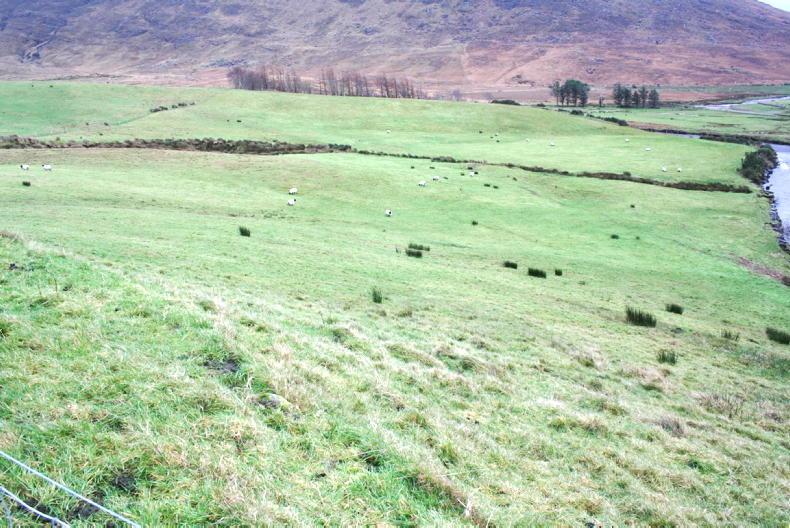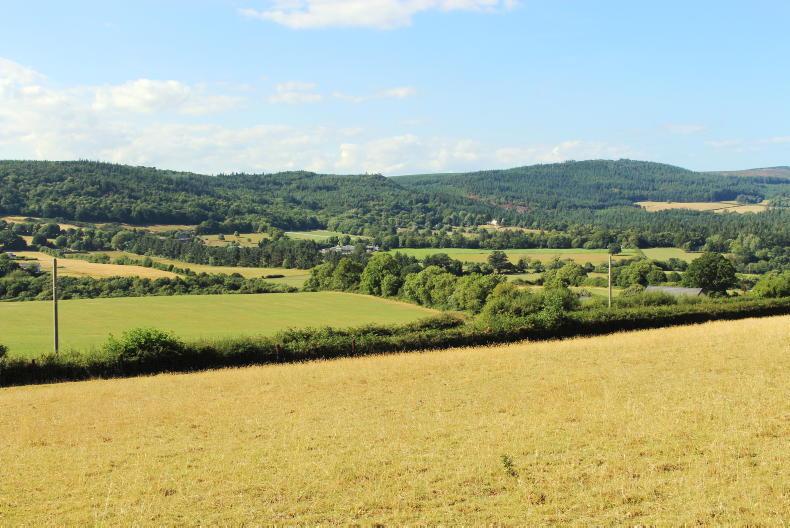A farm retirement scheme such as that introduced in the 1990s will have to be considered to facilitate succession on Irish farms.
This sentiment was expressed by a number of speakers at the recent Irish Rural History and Policy Conference, which concentrated this year on the issue of succession.
The president of the Irish Natura and Hill Farmers Association (INHFA), Vincent Roddy, told the conference – which was held at Mary Immaculate College, Limerick - that some form of retirement scheme will be needed to enable farmers to step back from full-time farming.
“With regard to bringing back a farm retirement scheme, this is something that we would like to see happen and hope in the new CAP programme post 2027 it is something that will feature,” Roddy said.
Speaking to the Irish Farmers Journal on the fringes of the conference, the INHFA leader said farm succession was most effective when both parties were facilitated.
“Currently there are good incentives for new entrants, but I believe more can be done to encourage older farmers to pass the farm on and to do so at a time that will be of greatest benefit to young farmers,” he said.
“A farm retirement scheme will provide income for a farmer that is retiring which is vital. But critically, it will also encourage the older farmer to think about succession,” Roddy explained.
Land transfers
“In my mind there is no doubt that a farm retirement scheme will see substantially more land transfers done at an earlier time that will benefit both the retiring farmer and the young/new entrant,” he maintained
Limerick dairy farmers John Hannon and Pat O’Brien pointed out that few farms can now provide the two incomes needed to enable succession.
They warned that even fewer intensive farms would be in a position to fund succession if the nitrates derogation is reduced further or lost.
The farmers argued that a retirement package worked in the 1990s and should be considered again to encourage succession.

The final session of the Irish Rural History and Policy Conference was chaired by writer and columnist Jim O'Brien and included well-known solicitor and succession advisor Aisling Meehan, as well Tomás Russell of UCD and Vincent Roddy of the INHFA.
Solicitor Aisling Meehan agreed that few farms could carry two incomes.
She maintained that innovative solutions were possible in circumstances where those inheriting the property were possibly working off-farm.
She said a “collaborative approach” could be employed in these situations which enabled the parents to continue to farm and receive the lion’s share of the proceeds from the enterprise, while the young generation had the security of ownership.
The Succession Act of 1965 was “ground breaking legislation” which facilitated “a quiet revolution” in the farm sector and Irish rural society, a recent conference in Limerick was told.
The Act totally transformed Irish succession law by giving the spouse of property owners a legal entitlement to a share of their deceased partner’s estate for the first time.
An assessment of the Succession Act formed the central plank of the Irish Rural History and Policy Conference, which was held at Mary Immaculate College in Limerick last week.
A legal analysis of the Act – which was first tabled by Charlie Haughey in 1964, and was later guided through the Dáil by his successor in the Department of Justice Brian Lenihan – was delivered by well-known farm consultant and barrister Ciarán Dolan.
Consensus
“There was a consensus that we needed to modernise and reform our succession legislation,” Dolan told the conference.
However, getting agreement on the extent of the reform proved problematic, with both the farm organisations and the legal profession opposing the legislation.
“In the debate prior to the finalisation of the Succession Act 1965, which came into effect 1 January 1967, there was a major concern that the Act would lead to a fragmentation of the family farm, because of the limitations placed on the rights of an individual to leave the farm to his chosen person,” Dolan explained.
“The introduction of a legal share to spouses was also seen as causing major problems for the survival of the family farm,” he added.
UCC historian Andrew McCarthy pointed out that much of the opposition
was prompted by a failure of the Fianna Fáil government to address the misgivings of both the Incorporated Law Society and the farm organisations, despite having promised to consult with both groups.
“Due to the lobbying carried out by the farm organisations at the time, substantial changes were made in the Succession Bill,” Dolan said.
Even so, the spine of the legislation remained intact, and the necessity for reform of succession legislation was outlined by veteran journalist Martin Ryan.
Ryan told how many farmers’ wives in the 1960s and ’70s were totally dependent on their husbands.
In some extreme cases farmers’ wives had to take their husbands to court to secure monies to feed their families, Ryan explained.
Some of the farmers involved were viewed as “pillars of the community”, Ryan added.
- DECLAN O’BRIEN
Young people will continue to walk away from farming unless models of employment are put in place which offer a realistic income and a sustainable work-life balance.
There is a succession crisis in agriculture partly because young people are no longer “shackled to the farm”, Teagasc sociologist Áine Macken-Walsh told the Limerick conference.
“Most people now have a more expanded world view and set of experiences, and connections with the outside world, that they can draw on in making empowered choices about their futures,” she said.
“So, they will walk away [from farming], and they have walked away, and they have very little hesitation in walking away,” Macken-Walsh maintained.
Developing realistic and sustainable models where people can combine off-farm and on-farm work, while delivering a fair income, were crucial to attracting and retaining young people in farming, the Teagasc specialist said.
Under attack
Macken-Walsh accepted that factors such as the reputation of farming impacted farm succession, and maintained that the sector was “never under such attack” as was currently the case.
“That undermines the sense of confidence, and the extent to which they [farmers] really want the next generation to take over,” Macken-Walsh claimed.
She said this was particularly in the context of climate and the radical transformation of the various schemes.
“I don’t think there is a scheme now that doesn’t have a strong ecological focus. Whether or not that is correct is not what I’m addressing at all.
“But, rather, what that transformation means for farmers; and what the younger generation are set to inherit,” Macken-Walsh maintained.
A farm retirement scheme such as that introduced in the 1990s will have to be considered to facilitate succession on Irish farms.
This sentiment was expressed by a number of speakers at the recent Irish Rural History and Policy Conference, which concentrated this year on the issue of succession.
The president of the Irish Natura and Hill Farmers Association (INHFA), Vincent Roddy, told the conference – which was held at Mary Immaculate College, Limerick - that some form of retirement scheme will be needed to enable farmers to step back from full-time farming.
“With regard to bringing back a farm retirement scheme, this is something that we would like to see happen and hope in the new CAP programme post 2027 it is something that will feature,” Roddy said.
Speaking to the Irish Farmers Journal on the fringes of the conference, the INHFA leader said farm succession was most effective when both parties were facilitated.
“Currently there are good incentives for new entrants, but I believe more can be done to encourage older farmers to pass the farm on and to do so at a time that will be of greatest benefit to young farmers,” he said.
“A farm retirement scheme will provide income for a farmer that is retiring which is vital. But critically, it will also encourage the older farmer to think about succession,” Roddy explained.
Land transfers
“In my mind there is no doubt that a farm retirement scheme will see substantially more land transfers done at an earlier time that will benefit both the retiring farmer and the young/new entrant,” he maintained
Limerick dairy farmers John Hannon and Pat O’Brien pointed out that few farms can now provide the two incomes needed to enable succession.
They warned that even fewer intensive farms would be in a position to fund succession if the nitrates derogation is reduced further or lost.
The farmers argued that a retirement package worked in the 1990s and should be considered again to encourage succession.

The final session of the Irish Rural History and Policy Conference was chaired by writer and columnist Jim O'Brien and included well-known solicitor and succession advisor Aisling Meehan, as well Tomás Russell of UCD and Vincent Roddy of the INHFA.
Solicitor Aisling Meehan agreed that few farms could carry two incomes.
She maintained that innovative solutions were possible in circumstances where those inheriting the property were possibly working off-farm.
She said a “collaborative approach” could be employed in these situations which enabled the parents to continue to farm and receive the lion’s share of the proceeds from the enterprise, while the young generation had the security of ownership.
The Succession Act of 1965 was “ground breaking legislation” which facilitated “a quiet revolution” in the farm sector and Irish rural society, a recent conference in Limerick was told.
The Act totally transformed Irish succession law by giving the spouse of property owners a legal entitlement to a share of their deceased partner’s estate for the first time.
An assessment of the Succession Act formed the central plank of the Irish Rural History and Policy Conference, which was held at Mary Immaculate College in Limerick last week.
A legal analysis of the Act – which was first tabled by Charlie Haughey in 1964, and was later guided through the Dáil by his successor in the Department of Justice Brian Lenihan – was delivered by well-known farm consultant and barrister Ciarán Dolan.
Consensus
“There was a consensus that we needed to modernise and reform our succession legislation,” Dolan told the conference.
However, getting agreement on the extent of the reform proved problematic, with both the farm organisations and the legal profession opposing the legislation.
“In the debate prior to the finalisation of the Succession Act 1965, which came into effect 1 January 1967, there was a major concern that the Act would lead to a fragmentation of the family farm, because of the limitations placed on the rights of an individual to leave the farm to his chosen person,” Dolan explained.
“The introduction of a legal share to spouses was also seen as causing major problems for the survival of the family farm,” he added.
UCC historian Andrew McCarthy pointed out that much of the opposition
was prompted by a failure of the Fianna Fáil government to address the misgivings of both the Incorporated Law Society and the farm organisations, despite having promised to consult with both groups.
“Due to the lobbying carried out by the farm organisations at the time, substantial changes were made in the Succession Bill,” Dolan said.
Even so, the spine of the legislation remained intact, and the necessity for reform of succession legislation was outlined by veteran journalist Martin Ryan.
Ryan told how many farmers’ wives in the 1960s and ’70s were totally dependent on their husbands.
In some extreme cases farmers’ wives had to take their husbands to court to secure monies to feed their families, Ryan explained.
Some of the farmers involved were viewed as “pillars of the community”, Ryan added.
- DECLAN O’BRIEN
Young people will continue to walk away from farming unless models of employment are put in place which offer a realistic income and a sustainable work-life balance.
There is a succession crisis in agriculture partly because young people are no longer “shackled to the farm”, Teagasc sociologist Áine Macken-Walsh told the Limerick conference.
“Most people now have a more expanded world view and set of experiences, and connections with the outside world, that they can draw on in making empowered choices about their futures,” she said.
“So, they will walk away [from farming], and they have walked away, and they have very little hesitation in walking away,” Macken-Walsh maintained.
Developing realistic and sustainable models where people can combine off-farm and on-farm work, while delivering a fair income, were crucial to attracting and retaining young people in farming, the Teagasc specialist said.
Under attack
Macken-Walsh accepted that factors such as the reputation of farming impacted farm succession, and maintained that the sector was “never under such attack” as was currently the case.
“That undermines the sense of confidence, and the extent to which they [farmers] really want the next generation to take over,” Macken-Walsh claimed.
She said this was particularly in the context of climate and the radical transformation of the various schemes.
“I don’t think there is a scheme now that doesn’t have a strong ecological focus. Whether or not that is correct is not what I’m addressing at all.
“But, rather, what that transformation means for farmers; and what the younger generation are set to inherit,” Macken-Walsh maintained.










SHARING OPTIONS